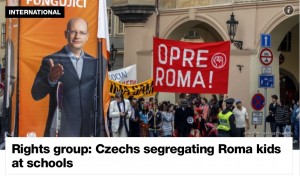Neues Deutschland (2014) reports on ongoing pogroms and incitement against Rroma in Halle. In the recent months, repeated assaults against Rroma occurred in the quarter of Silberhöhe. Moreover, xenophobic Facebook groups called for violence against the minority. Silberhöhe is a poor district, which is characterised by industrialised apartment blocks: “The attackers were between 10 and 13 years old. In mid-September, a young Roma woman and her two-year old son were attacked by adolescents in Silberhöhe, an industrialised building quarter in Halle. […] The instigators however, are adults. They operate Internet sites such as “hallemax.de”, where in hard tone and partly with multiple entries a day, one speaks about “alienation” and against Rroma. […] The focus of their aggression is a group of 40 families, belonging to the Roma minority, who immigrated from Romania and Spain – in the context of the EU-wide freedom of movement. From the beginning, the newcomers were faced with dislike, aggression and hatred. Especially the children reported bullying on the street or in the supermarket, the mobile victim counselling of Halle states. Later, a so-called “vigilante group” was founded, who was supposed to ensure “peace and order” with patrols in Silberhöhe.” In response to the xenophobic actions, a group against anti-Semitism was founded. The alliance “Hall against right-wing extremism” organised counter-demonstrations to the hostile actions against Rroma, in order to express their solidarity with the minority and to stand up against anti-Semitism. In addition, a meeting was organised to counter the prejudices against immigrants with facts and knowledge. In Germany, there are an estimated 110,000 to 130,000 Rroma, many of them for generations. They are integrated, go to work, speak German and send their children to school.

